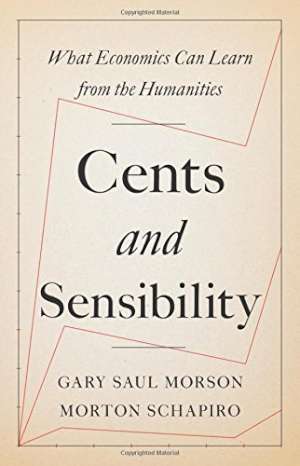05 December 2017
Cents and Sensibility
What Economics can Learn from the Humanities
Gary Saul Morson and Morton Schapiro
2017, Princeton University Press, 320 pages,
ISBN 9780691176680
Reviewer: Richard Bronk, London School of Economics and Political Science

Ever since J.S Mill argued that Bentham and Coleridge were archetypes of complementary half-truths, and C.P. Snow lamented two cultures divided by a ‘gulf of mutual incomprehension’, there have been periodic attempts to show how social scientists (and economists in particular) can enrich their understanding by engaging in a dialogue with the humanities. Cents and Sensibility is an engaging and provocative example of the genre.
The book covers well-trodden ground in arguing that economics is guilty of a misleading level of abstraction from the particularity of economic problems, the complexity of human motivation, and the variety of cultures framing the beliefs and preferences of economic actors. Despite an occasionally polemical tone, the authors are careful to acknowledge the many insights that a narrow economic approach can provide, while arguing these insights must be supplemented by appreciation of other factors that only alternative disciplinary approaches can illuminate.
This multi-disciplinary perspective is seen as necessary whenever economics is applied to particular problems and policy questions. Indeed, one of the volume’s strengths is its engagement with extended examples of practical policy questions and real-world economic problems – including university enrolments and economic development – examples that demonstrate clearly the limitations of reliance on any single, necessarily limited, analytical approach.
It is not original, of course, to argue that culture matters, and that economic actors are sometimes neither rational nor (as behavioural economics would have us believe) predictably irrational. Moreover, it is perhaps a shame that in seeking to champion a ‘humanist’ approach, the book elides well-rehearsed arguments in favour of a multidisciplinary approach (and the use of qualitative, non-mathematical, evidence) with a much more original and specific argument in favour of economists reading literature, particularly novels.
The authors are at their best when showing how repeated practice in seeing the world from the perspective of different literary characters builds the capacity for empathy. This imaginative ability to place oneself in the shoes of others – and see the world from their perspective – is a transferable skill that is essential to our ability to read the cultural and conceptual frameworks governing the beliefs and behaviour of particular groups, and hence design more culturally attuned and effective policies.
Literature (and the humanities in general) also show ‘the ineffable complexity of things’ and the contingency and particularity of events; and this, in turn, demonstrates, the authors argue, the paramount importance of judgment and practical wisdom (rather than the mechanical application of theory) when making real-world economic decisions. It is hard to argue with this, even if some readers will demur at the notion that reading Dostoevsky and Tolstoy is the best training for such judgment and wisdom.
For a long book, there are some surprising omissions. There is only passing reference, for example, to the use of literary criticism techniques by Deirdre McCloskey and others to understand the rhetorical and literary aspects of economics – in particular its suffusion with (frequently distorting) metaphors from nineteenth-century physics.
Cents and Sensibility is avowedly ‘anti-theory’, and this may explain its focus on multidisciplinary explanatory narratives and practical problem solving to the exclusion of any interest in enhancing the microfoundations of economic theory itself or specifying the boundaries of applicability of standard approaches.
A central theme in the volume is that stories and narratives are essential to explaining the contingency and idiosyncrasy of many real-world events. Indeed, its most original theoretical innovation is perhaps the notion that the degree of ‘narrativeness’ required for scientific or historical explanation can be calibrated by the degree to which contingency, indeterminacy, or particular cultures play a role. Disappointingly, however, no attempt is made to build on this notion to understand how economic agents themselves – particularly when faced with radical uncertainty – resort to the use of imaginaries and narratives to make sense of their predicament and provide the conviction to act. Such imaginaries are ultimately a source of contingency in economic behaviour, while shared narratives help coordinate action and may be instruments of policy and power. When a particular (and misleading) narrative becomes dominant it may lead to an analytical monoculture that is profoundly destabilising to markets.
Fascinating work is being done in this area by Douglas Holmes – on the use of narratives and words by central banks; by David Tuckett – on the role of conviction narratives in investment; and by Robert Shiller – on ‘narrative economics’ and the contagious properties of market narratives. More generally, as Jens Beckert argues in Imagined Futures, economic agents use narratives and ‘fictional expectations’ to structure their beliefs and actions in conditions of uncertainty. It would have been illuminating if Morson and Schapiro had contributed insights from literature to help understand the mental process of combining fact and imagination to produce credible economic ‘fictions’.
References
Beckert, Jens (2016), Imagined Futures: Fictional Expectations and Capitalist Dynamics, Harvard University Press
Holmes, Douglas (2014), Economy of Words: Communicative Imperatives in Central Banks, University of Chicago Press
Leavis, F.R., (ed) (1950), Mill on Bentham and Coleridge, Chatto and Windus
McCloskey, Deirdre (1998), The Rhetoric of Economics, University of Wisconsin Press
Shiller, Robert J. (2017), ‘Narrative Economics’, Cowles Foundation Discussion Paper 2069: http://cowles.yale.edu
Snow, C.P (1959), The Two Cultures and the Scientific Revolution, Cambridge University Press
Tuckett, David (2011), Minding the Markets: An Emotional Finance View of Financial Instability, Macmillan
